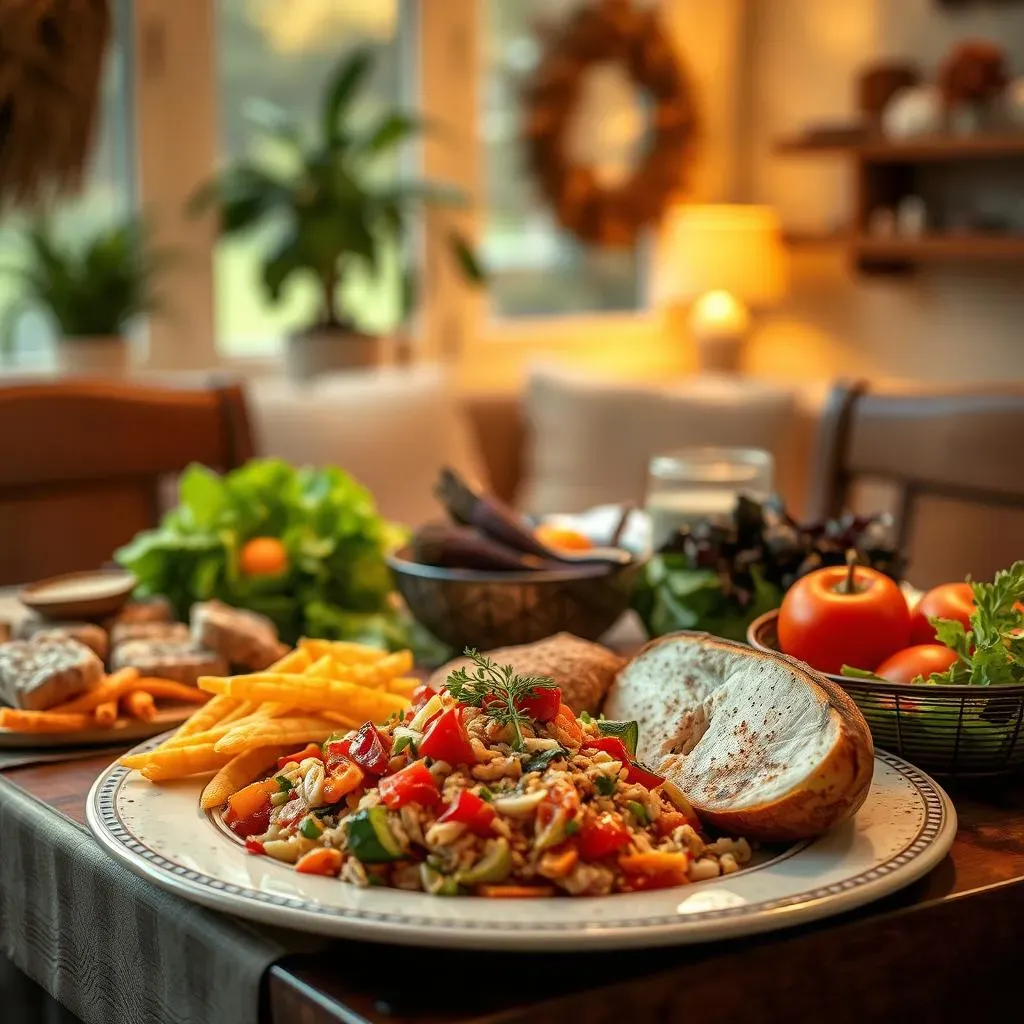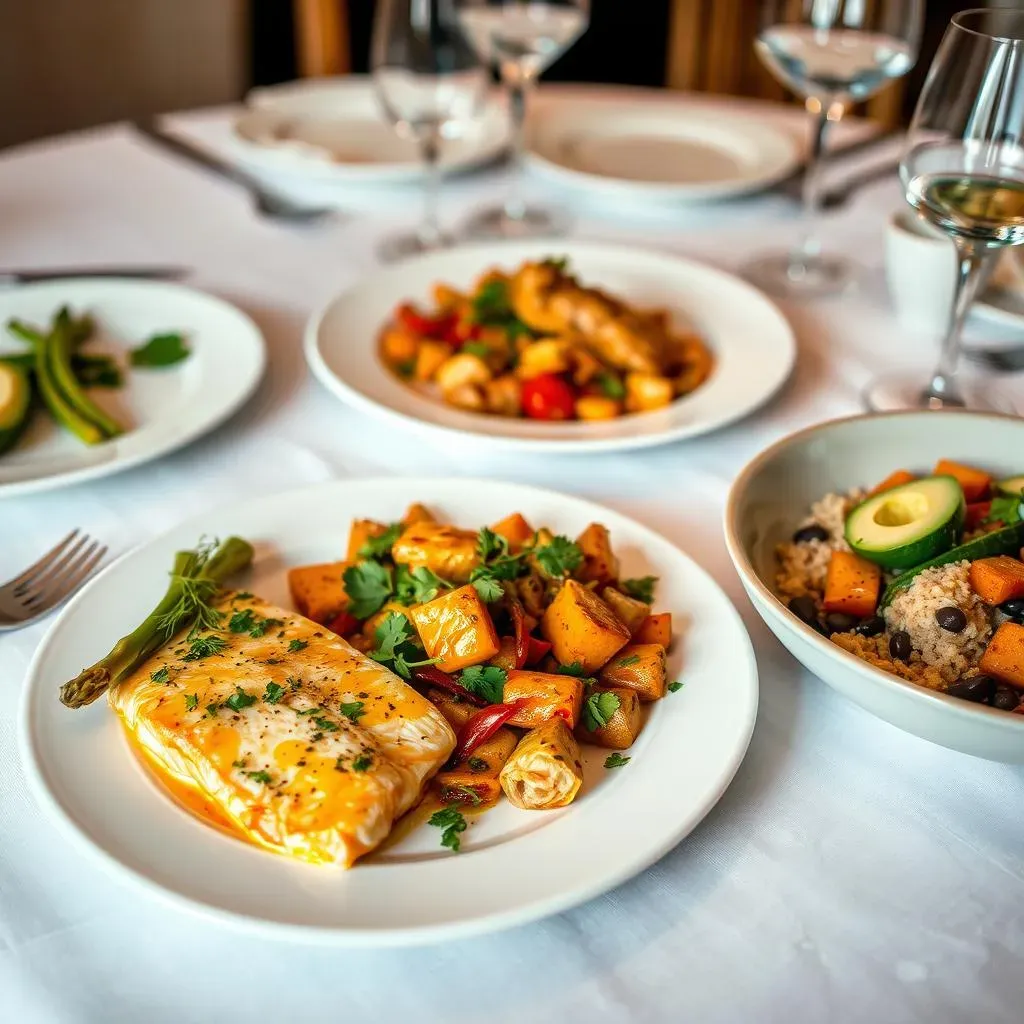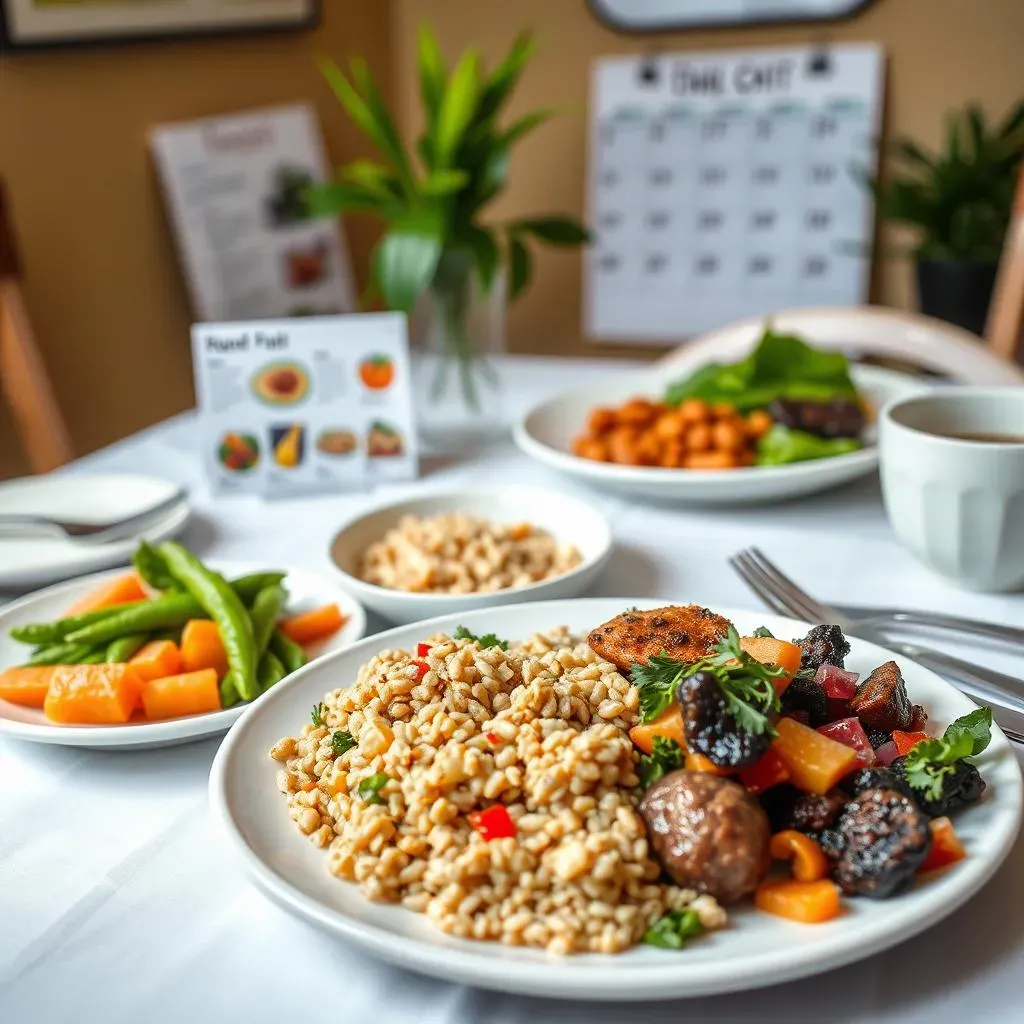Table of Contents
Are you tired of dinner dilemmas that leave your gut feeling less than thrilled? You're not alone. Many of us struggle to find meals that are both satisfying and kind to our digestive systems. That's where gut healthy dinner recipes come in. Imagine enjoying delicious, home-cooked meals that not only tantalize your taste buds but also nourish your gut microbiome, leading to improved digestion, boosted immunity, and overall well-being. This article is your roadmap to creating gut-friendly dinners that are both easy to prepare and incredibly beneficial. We'll explore why gut health is so crucial, dive into a selection of top-notch recipes perfect for a weeknight meal, highlight key ingredients that support a thriving gut, and provide tips on making gut-healthy eating a sustainable part of your lifestyle. Get ready to transform your dinner plate into a powerhouse of flavor and wellness!
Why Gut Health Matters for Dinner and Beyond

Why Gut Health Matters for Dinner and Beyond
The Gut-Brain Connection and Your Evening Meal
Ever notice how certain foods can make you feel sluggish or even anxious? That's the gut-brain connection at work. Your gut is practically a second brain, influencing everything from your mood to your sleep patterns. What you eat for dinner significantly impacts this connection. A gut-friendly dinner can lead to a more relaxed evening, better sleep, and even improved mental clarity the next day.
Think of it this way: a happy gut equals a happy brain. When your gut is thriving with diverse and beneficial bacteria, it sends positive signals to your brain, promoting a sense of well-being. Conversely, a gut struggling with inflammation or an imbalance of bacteria can trigger negative signals, contributing to anxiety, depression, and other mood disorders.
Digestion, Immunity, and Dinner Choices
Your gut is a major player in your immune system. In fact, a significant portion of your immune cells resides in your gut. A healthy gut lining acts as a barrier, preventing harmful substances from entering your bloodstream. The food you choose for dinner can either strengthen or weaken this barrier. Processed foods, high in sugar and unhealthy fats, can damage the gut lining, leading to inflammation and a weakened immune response. On the other hand, nutrient-rich, whole foods can nourish the gut lining, promoting a robust immune system.
Consider this: A dinner rich in fiber, prebiotics, and probiotics can help cultivate a thriving community of beneficial bacteria in your gut. These bacteria not only aid in digestion but also produce essential vitamins, support immune function, and protect against harmful pathogens. It's like building a fortress for your health, one delicious dinner at a time.
Long-Term Health Benefits of Gut-Friendly Dinners
Making gut-healthy dinner choices isn't just about feeling good tonight; it's about investing in your long-term health. A consistently healthy gut can reduce your risk of chronic diseases like heart disease, type 2 diabetes, and even certain types of cancer. It's a proactive step you can take to improve your overall quality of life as you age.
Imagine a future where you're vibrant, energetic, and less susceptible to illness. That future starts with the choices you make at dinner tonight. By prioritizing gut-friendly ingredients and cooking methods, you're laying the foundation for a healthier, happier you for years to come. Think of it as a delicious and sustainable way to safeguard your well-being.
Benefit | Description |
|---|---|
Improved Digestion | Reduces bloating, gas, and other digestive discomforts. |
Boosted Immunity | Strengthens the gut lining and supports immune cell function. |
Enhanced Mood | Promotes a healthy gut-brain connection, reducing anxiety and improving mood. |
Reduced Risk of Chronic Disease | Lowers inflammation and protects against heart disease, diabetes, and cancer. |
Top Gut Healthy Dinner Recipes to Try Tonight

Top Gut Healthy Dinner Recipes to Try Tonight
Lemon Herb Baked Salmon with Asparagus
first up, we've got a winner: Lemon Herb Baked Salmon with Asparagus. Salmon is packed with omega-3 fatty acids, which are fantastic for reducing inflammation in the gut. Asparagus is a prebiotic powerhouse, feeding those beneficial bacteria. Plus, it's super simple to throw together. Just drizzle salmon fillets and asparagus spears with olive oil, lemon juice, garlic, and your favorite herbs (dill, thyme, and rosemary work great). Bake until the salmon is flaky and the asparagus is tender. Boom – a delicious and nutritious dinner in under 30 minutes!
For an extra gut-boosting kick, consider adding a dollop of plain Greek yogurt on top of the salmon. Greek yogurt is a great source of probiotics, further enhancing the gut-friendly benefits of this meal. It also adds a creamy tang that complements the lemon and herbs perfectly. Trust me, your gut (and your taste buds) will thank you.
Chicken and Vegetable Stir-Fry with Ginger and Turmeric
Next, let's talk about Chicken and Vegetable Stir-Fry with Ginger and Turmeric. Stir-fries are incredibly versatile and a fantastic way to load up on a variety of gut-friendly veggies. Ginger and turmeric are both potent anti-inflammatory spices that can help soothe the gut and promote healthy digestion. Use lean chicken breast as your protein source and include veggies like broccoli, carrots, bell peppers, and spinach. Sauté everything in coconut oil or olive oil and season generously with ginger, turmeric, garlic, and a splash of soy sauce or tamari.
To make this stir-fry even more gut-friendly, consider adding a serving of fermented vegetables like kimchi or sauerkraut on the side. Fermented foods are rich in probiotics, which can help diversify your gut microbiome and improve digestion. They also add a delicious tangy flavor that complements the savory stir-fry perfectly. It's a win-win!
Quinoa Bowl with Roasted Sweet Potatoes, Black Beans, and Avocado
Finally, we have a plant-based option: Quinoa Bowl with Roasted Sweet Potatoes, Black Beans, and Avocado. This bowl is packed with fiber, prebiotics, and healthy fats, making it a gut-friendly powerhouse. Quinoa is a complete protein source and a great alternative to rice. Sweet potatoes are rich in fiber and antioxidants, while black beans are an excellent source of resistant starch, which feeds beneficial gut bacteria. Avocado adds healthy fats and a creamy texture.
To assemble the bowl, simply roast cubed sweet potatoes with olive oil, cinnamon, and a pinch of salt. Cook quinoa according to package directions. Combine the roasted sweet potatoes, cooked quinoa, black beans, and sliced avocado in a bowl. Drizzle with a tahini dressing or a simple vinaigrette. For an extra boost of flavor and nutrients, consider adding some chopped cilantro, toasted pumpkin seeds, or a sprinkle of nutritional yeast. This bowl is not only delicious and satisfying but also incredibly nourishing for your gut.
Recipe | Key Gut-Friendly Ingredients | Why It's Good for Your Gut |
|---|---|---|
Lemon Herb Baked Salmon with Asparagus | Salmon, Asparagus, Greek Yogurt | Omega-3s reduce inflammation, prebiotics feed good bacteria, probiotics enhance gut health. |
Chicken and Vegetable Stir-Fry with Ginger and Turmeric | Ginger, Turmeric, Broccoli, Kimchi | Anti-inflammatory spices, fiber-rich veggies, probiotics diversify microbiome. |
Quinoa Bowl with Roasted Sweet Potatoes, Black Beans, and Avocado | Quinoa, Sweet Potatoes, Black Beans, Avocado | Complete protein, fiber and antioxidants, resistant starch, healthy fats nourish gut. |
Ingredients That Promote a Healthy Gut: A Dinner Guide

Ingredients That Promote a Healthy Gut: A Dinner Guide
Prebiotic Powerhouses: Fueling the Good Bacteria
Prebiotics are like fertilizer for the beneficial bacteria in your gut. They're non-digestible fibers that selectively feed the good guys, helping them thrive and multiply. Incorporating prebiotic-rich foods into your dinner is a fantastic way to support a healthy gut microbiome. Some top prebiotic sources include garlic, onions, leeks, asparagus, bananas (especially slightly green ones), and oats. Think about adding roasted garlic to your next veggie dish, sautéing onions and leeks as a base for your stir-fry, or enjoying a small serving of overnight oats with banana for dessert.
For example, I love roasting a whole head of garlic with olive oil and herbs and then spreading the roasted cloves on whole-grain toast as a side dish. The garlic becomes sweet and mellow, and it's packed with prebiotics that my gut loves. It's also a great way to add flavor to soups, stews, and sauces. Don't be afraid to experiment and find ways to incorporate these prebiotic powerhouses into your favorite dinner recipes. Your gut will thank you for it!
Probiotic-Rich Foods: Adding Beneficial Bacteria Directly
Probiotics are live microorganisms that, when consumed in adequate amounts, confer a health benefit on the host. In simpler terms, they're the good bacteria that you want to add directly to your gut. Fermented foods are excellent sources of probiotics. Think yogurt (especially plain Greek yogurt with live and active cultures), kefir, sauerkraut, kimchi, kombucha, and miso. Adding a serving of fermented food to your dinner can help diversify your gut microbiome and improve digestion. However, be mindful of added sugars and sodium in some commercially prepared fermented foods.
I often add a dollop of plain Greek yogurt to my soups or stews for a creamy texture and a probiotic boost. I also enjoy a small serving of kimchi or sauerkraut as a side dish with my meals. If you're new to fermented foods, start with small amounts and gradually increase your intake to avoid digestive discomfort. Remember, consistency is key when it comes to reaping the benefits of probiotics. Aim to include a serving of fermented food in your dinner at least a few times a week.
Fiber-Rich Vegetables: Essential for Gut Health
Fiber is crucial for maintaining a healthy gut. It adds bulk to your stool, promoting regular bowel movements and preventing constipation. It also feeds beneficial gut bacteria, contributing to a diverse and thriving microbiome. Aim to include a variety of fiber-rich vegetables in your dinner, such as broccoli, Brussels sprouts, carrots, spinach, sweet potatoes, and peas. Roasting, steaming, or stir-frying are all great ways to prepare these veggies.
I try to make half of my dinner plate consist of non-starchy vegetables. I love roasting a medley of vegetables with olive oil, herbs, and spices. It's a simple and delicious way to get a good dose of fiber and nutrients. You can also add vegetables to soups, stews, and stir-fries. Get creative and experiment with different combinations of vegetables to find your favorites. Remember, the more colorful your plate, the more diverse the nutrients and fiber you're getting.
Ingredient Group | Examples | Benefits |
|---|---|---|
Prebiotics | Garlic, Onions, Leeks, Asparagus, Bananas, Oats | Fuel beneficial gut bacteria, promote a healthy microbiome. |
Probiotics | Yogurt, Kefir, Sauerkraut, Kimchi, Kombucha, Miso | Add live beneficial bacteria to the gut, improve digestion. |
Fiber-Rich Vegetables | Broccoli, Brussels Sprouts, Carrots, Spinach, Sweet Potatoes, Peas | Promote regular bowel movements, feed beneficial gut bacteria. |
Making Gut Healthy Dinner Recipes a Sustainable Habit

Making Gut Healthy Dinner Recipes a Sustainable Habit
Start Small, Start Simple
Don't try to overhaul your entire diet overnight. That's a recipe for burnout (pun intended!). Instead, focus on making small, manageable changes that you can stick with long-term. Maybe it's swapping out processed snacks for a piece of fruit, adding a side of steamed vegetables to your usual dinner, or trying one new gut-friendly recipe each week. The key is to find changes that fit seamlessly into your lifestyle and that you actually enjoy. Remember, consistency is more important than perfection.
For instance, instead of completely eliminating your favorite comfort food, try making a healthier version of it. If you love pasta, swap out white pasta for whole-wheat or lentil-based pasta and load it up with veggies. If you crave pizza, make it at home with a whole-wheat crust, low-fat cheese, and plenty of vegetables. Small tweaks can make a big difference over time.
Plan Your Meals and Prep Ahead
One of the biggest obstacles to healthy eating is lack of planning. When you're tired and hungry after a long day, it's tempting to reach for the easiest (and often unhealthiest) option. That's where meal planning and prep come in. Take some time each week to plan out your dinners and make a grocery list. Then, spend a few hours on the weekend prepping ingredients. Chop vegetables, cook grains, and marinate proteins. This way, when dinnertime rolls around, you'll have everything you need to whip up a gut-friendly meal in minutes.
I like to spend a couple of hours on Sunday afternoons prepping for the week ahead. I'll roast a big batch of vegetables, cook a pot of quinoa or brown rice, and make a batch of homemade salad dressing. Then, during the week, I can easily assemble healthy and delicious meals in no time. It's a game-changer!
Listen to Your Gut and Adjust Accordingly
Everyone's gut is different, and what works for one person may not work for another. Pay attention to how your body responds to different foods and adjust your diet accordingly. If you notice that certain foods trigger digestive discomfort, try eliminating them for a while and see if your symptoms improve. You may also want to experiment with different cooking methods and portion sizes. The key is to be mindful of your body's signals and to tailor your diet to your individual needs.
For example, some people find that they tolerate cooked vegetables better than raw vegetables, especially if they have digestive issues. Others may need to limit their intake of certain high-FODMAP foods, such as onions, garlic, and apples. It's all about finding what works best for you. If you're unsure where to start, consider working with a registered dietitian who can help you develop a personalized gut-healthy eating plan.
Habit | Description | Example |
|---|---|---|
Start Small | Make gradual changes instead of drastic overhauls. | Add a side of steamed vegetables to your usual dinner. |
Meal Plan & Prep | Plan meals and prep ingredients in advance to save time. | Chop vegetables and cook grains on the weekend. |
Listen to Your Gut | Pay attention to how your body responds to different foods. | Eliminate foods that trigger digestive discomfort. |
Conclusion: Savoring the Benefits of Gut Healthy Dinner Recipes
Incorporating gut healthy dinner recipes into your routine is a delicious and impactful way to support your overall well-being. By understanding the importance of gut health, exploring diverse recipes, and prioritizing gut-friendly ingredients, you can transform your dinners into nourishing experiences. Remember, consistency is key to reaping the long-term benefits of a balanced gut microbiome. So, embrace the journey, experiment with flavors, and enjoy the delicious path to a happier, healthier gut!